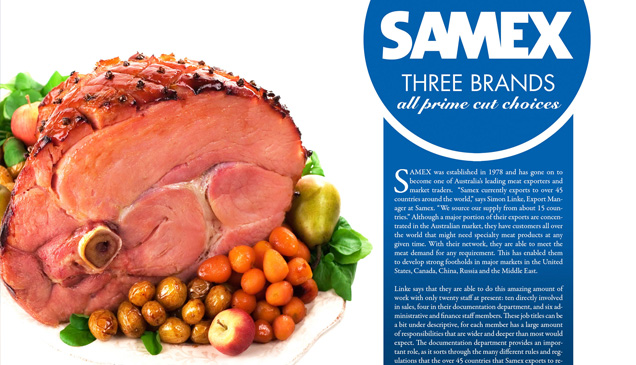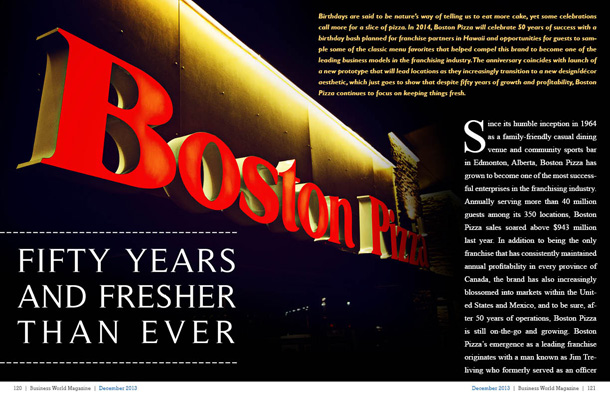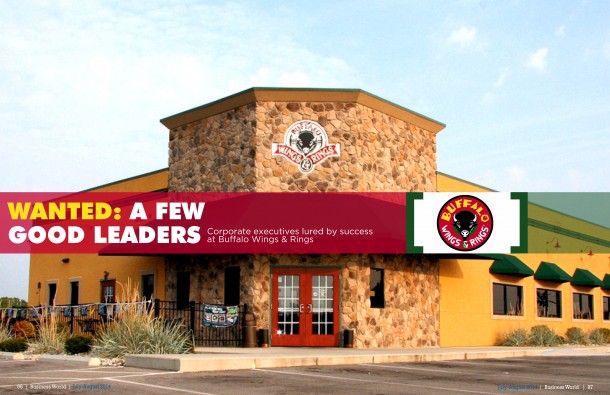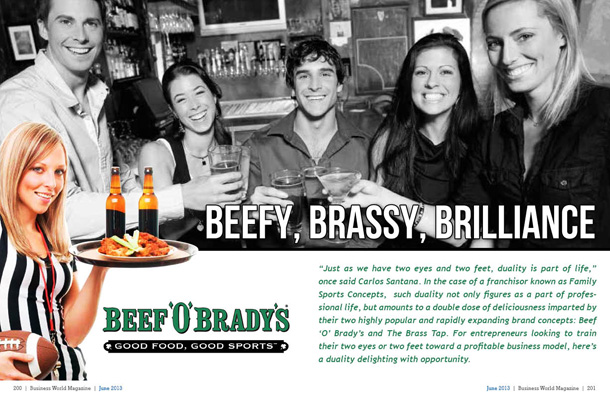
SAMEX: Three Brands, all prime cut choices
SAMEX was established in 1978 and has gone on to become one of Australia’s leading meat exporters and market traders. “Samex currently exports to over 45 countries around the world,” says Simon Linke, Export Manager at Samex. “We source our supply from about 15 countries.” Although a major portion of their exports are concentrated in the Australian market, they have customers all over the world that might need specialty meat products at any given time. With their network, they are able to meet the meat demand for any requirement. This has enabled them to develop strong footholds in major markets in the United States, Canada, China, Russia and the Middle East.
Linke says that they are able to do this amazing amount of work with only twenty staff at present: ten directly involved in sales, four in their documentation department, and six administrative and finance staff members. These job titles can be a bit under descriptive, for each member has a large amount of responsibilities that are wider and deeper than most would expect. The documentation department provides an important role, as it sorts through the many different rules and regulations that the over 45 countries that Samex exports to requires. “We work with AQIS to provide documentation for our clients that certify the wholesomeness of our products so that they can clear the goods and the country of import. This is all necessary work if you are an exporter of the size that Samex is,” says Linke.
Samex operates and maintains its own internal shipping department as well; this function is combined with the documentation department. From here they manage their shipping containers that range in size from 20 ft. long to 40 ft. “We also manage shipments by air, and these are often for higher end clients like hotels and restaurants. These are chilled products and need to get there fast,” says Linke.
Where is SAMEX? Everywhere
“You can find our meat being consumed by an executive in a five star hotel in Beijing China all the way to a factory worker in the far Northern regions of Russia. We are very high-end right through to lower end, and what I mean is daily home use meat,” says Linke. He does not want to give people the wrong impression that because the meat costs less, that the quality and care is not in the product. It is. This is one of the things Linke describes as a point of difference, the care and quality that they source their meat.
Samex supplies its customers around the world under three different brands: Samex, Down Under, and Aussie Select. These brands have become very well known, especially in the United States, where they hold a great place in the mind of the consumer. “It would seem that we have a good standing in the organic lamb business. At the moment we are supplying all that we can but we are limited by the amount of organic lamb that is grown,” says Linke. He sees that organics represents a growth industry, and lamb itself is a large market share. In the past, beef prices were higher because of the demand, but that trend has changed, and lamb is commanding a higher price due to the demand placed on the available stock. “I think Australia is very far ahead in the organics market, and we have many people looking to us to see how it is done,” he says.
Changing markets, changing needs
To meet some of the demand for their product they have opened up a distribution centre in China. From there they are able to deliver the high-quality cuts that the five-star hotels and restaurants need. This presents a new market for them, and it behaves completely differently from what they are used to in the North American market. Linke says that when the economy is up in North America, many people spend their disposable income on new televisions and other luxury goods. In China, with the strength of their economy, Samex is finding that many people are looking to spend it on quality imported foodstuffs. “What we are seeing now in countries like China and India, you see that their increased income is being spent on food. People use it as a sign of a growing income, and they consume more protein,” he says. Beef and lamb are the products of choice in these markets, and with the increased demands there are also project shortages, which in turn forces up world meat prices. This is all good news to Samex and Australian farmers. “Australia and Samex are committed to the challenge of supplying that product range to these developing countries, and having a greater market presence there – now and in the years to come,” says Linke with confidence.
“The Australian sheep and lamb meat business is a good one to be in, and there are going to be more and more opportunities to grow this industry,” says Linke. “It is a good income earner for them. If they look at the way they farm they can certainly get some good returns out of it.”
Looking for good returns often means investing in green technologies and shipping methods. The shipping industry itself has invested heavily in better planning and fuel usage, which produces savings that are passed down to Samex. But by the same token, Linke says that Samex is also encouraging their packaging suppliers to look at more economical and lighter ways in which to package their branded products. “We hope that they invest some time and research into how they can supply us with more environmentally friendly packaging,” he says.
Samex, Linke says, is committed to their customers and clients. “We want to ensure that we supply them with a good quality product at a competitive price. This allows them to stay in business so that when the next time comes around they are there to buy from us. “
It is simple: treat your customers with care and you foster trust and promote their growth. This is how Samex works and it is how everyone in the market should function. For the future they are looking to open up the opportunities that they have already developed in China as well as Africa and other developing countries. There are opportunities everywhere, and Samex will be there to see how they can get the best cut.








